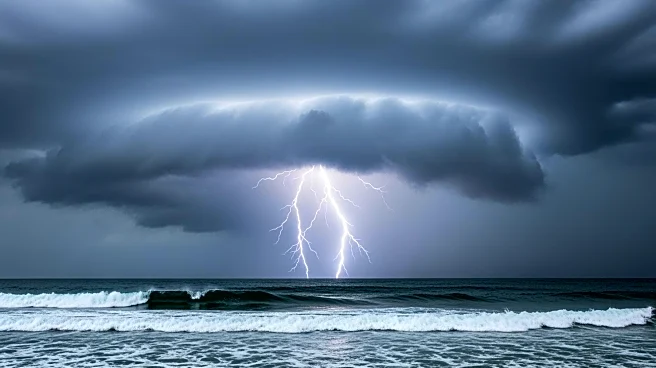What's Happening?
Hurricane Melissa, one of the most powerful storms in history, has caused widespread destruction across the Caribbean. The storm made landfall in Jamaica as a Category 5 hurricane, bringing 185 mph winds and massive flooding. Rescue operations are underway,
but efforts are hindered by power outages and blocked roads. The death toll has risen to over 30, with casualties reported in Jamaica, Haiti, and the Dominican Republic. Jamaica's Minister of Education, Dana Dixon, emphasized the resilience of the nation despite the devastation. The storm is now moving towards Bermuda, where preparations are being made for its anticipated passage.
Why It's Important?
The impact of Hurricane Melissa highlights the vulnerability of Caribbean nations to extreme weather events, which are exacerbated by climate change. The destruction has prompted international support, including aid from the United States. The storm's rapid intensification is a stark reminder of the effects of global warming, as warmer ocean waters fuel stronger hurricanes. The devastation in Jamaica and Haiti underscores the need for improved infrastructure and disaster preparedness in the region. The situation also raises concerns about the long-term economic and social impacts on affected communities.
What's Next?
As Hurricane Melissa approaches Bermuda, officials have issued a hurricane warning and are urging residents to complete preparations. Schools and ferries will be closed as a precaution. The storm is expected to weaken as it moves northeast, potentially impacting Newfoundland. The U.S. East Coast may experience dangerous surf and rip currents due to ocean swells generated by the hurricane. The international community is likely to continue providing aid to the Caribbean nations affected by the storm, focusing on both immediate relief and long-term recovery efforts.
Beyond the Headlines
The devastation caused by Hurricane Melissa has reignited discussions on climate change and its role in intensifying hurricanes. Jamaican Prime Minister Andrew Holness recently addressed the United Nations, calling for global action to reduce emissions. The storm's impact on Jamaica, a nation with much of its economy on the coast, highlights the urgent need for climate resilience measures. The strained relationship between the U.S. and Cuba may affect the delivery of humanitarian aid, as historical tensions have complicated past relief efforts.















